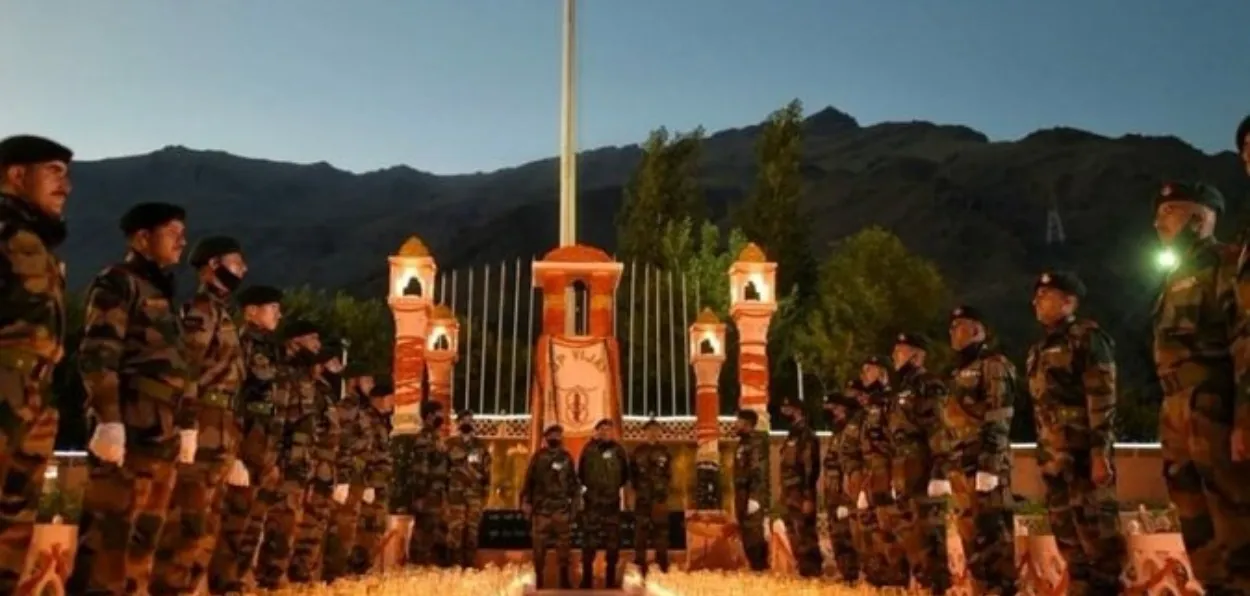
 Aasha Khosa
Aasha Khosa
It was 25 years ago that Pakistan waged yet another misadventure against India to wrest Kashmir. This time, it ventured into the barren and icy heights of Kargil, far away from Kashmir. The incursion turned out to be the last straw on Pakistan's credibility in the eyes of India, and the world realized the catastrophic implications of Islamabad’s obsession with J&K. Further, the conflict exposed Pakistan's fragility as a State where an Army Chief had risked a war without consulting or taking consent of the elected government.
The two-month Kargil conflict was provoked by the Pakistan Army that sent troops of the Northern Light Infantry, then a para-military Force - like our Rashtriya Rifles - and Special Forces in plainclothes to the barren heights in Kargil overlooking the arterial link to Saichen Glacier and Leh.
In its shoddiness, Pakistan didn’t admit its troops were occupying the Indian high-altitude posts that were routinely vacated during winter. Musharraf’s Army claimed the occupiers in plainclothes were ‘Kashmiri Mujahideen’ fighting for a cause. Also, for all his experience, General Musharaf’s Kargil plan had no clause on India’s anticipated reaction.
Lt Gen Shahid Aziz of Pakistan was the head of the Analysis wing of the ISI during the Kargil War. He was also a confidante of the architect of the conflict Army Chief Gen Pervez Musharraf. After his retirement, he spilled the beans in an article Putting our Children in Line of Fire about Kargil, which he wrote for The Nation English newspaper.
"There were no mujahideen, only taped wireless messages, which fooled no one. Our soldiers were made to occupy barren ridges, with hand-held weapons and ammunition. There was no way to dig in, so they were told to make parapets with loose stones and sit behind them, with no overhead protection. The boys were comforted by their commander’s assessment that no serious response would come. But it did — wave after wave, supported by massive air-bursting artillery and repeated air attacks. The enemy still couldn’t manage to capture the peaks, and instead filled in the valleys. Cut off and forsaken, our posts started collapsing one after the other, though the general publicly denied it.”
Indian troops celebrating victory in the Kargil war
It turned out that when Pakistani Prime Minister Nawaz Sharif was welcoming Atal Bihari Vajpayee on his famous bus travel to Pakistan at the Attari-Wagah border, his Army chief was planning the Kargil operation with a couple of his confidants. Vajapeyee-Sharif's handshake evoked optimism in both countries about peace being given a chance yet nobody realized the Pakistan Army Chief was planning to sabotage it.
The world was looking at a new dawn of peace in the sub-continent while Musharraf was thinking of snapping the crucial road link the Indian army used.
Ashfaq Hussain, formerly with Pakistan’s elite Special Services Group, who was a Colonel in the ISPR at the time of the Kargil war, wrote in his book Witness to Blunder: Kargil Story Unfolds that Kargil was a misadventure by Musharraf.
The book was the first to reveal that Musharraf flew across the Line of Control (LOC) on March 28, 1999, and traveled 11 km into the Indian side. He also spent a night in the Indian Territory and was accompanied by Brig Masood Aslam, then commander of the 80 Brigade.
Naseem Zehra, a senior Pakistani journalist who has written the book From Kargil to the Coup told BBC that Gen Musharraf had casually told Prime Minister Nawaz Sharif about his Kargil plans on 17 May, a few days before the Indians detected the presence of Pakistanis in Kargil at the height of 16,500 ft to 18000 ft.
She told BBC in an interview that, “Nawaz Sharif was briefed with maps that are typically understood only by the army men. As such we know how short his attention span was and I don’t think he (Sharif) understood the full implications of the plan.”
Hussain’s revelations on the Kargil war also debunk Musharraf’s claim that only 270 Pakistani personnel had died in the war as grossly underreporting.
Zehra told the BBC that though officially no authentic figures of war casualties have been released, Pakistan had lost more men than it had lost in the 1971 war with India. Sharif later said that over 4,000 Pakistani troops were killed in the operation.
India had lost 542 men in the war while about 1,363 were injured.
A video of the Kargil martyers memorial at Drass on Kargil Vijay Diwas:
#WATCH | Ladakh: Visuals from Kargil War Memorial in Drass.
— ANI (@ANI) July 26, 2024
Prime Minister Narendra Modi will visit here today to pay tribute to the heroes of the Kargil War on the occasion of 25th #KargilVijayDiwas2024. pic.twitter.com/mF589y4nAh
There was much criticism of the Kargil operation by the political leaders of Pakistan. Interestingly, Gen. Musharraf had been cooking this idea in his head for a long time. When Benazir Bhutto was re-elected PM for the second time, he presented his plan to her.
In her biography Daughter of the East, Benazir writes she asked Musharraf whether he realized the implications of such a misadventure and summarily dismissed the idea. She called the Kargil War "Pakistan's greatest blunder".
Many ex-officials of the military and the ISI also were of the view that "Kargil was a waste of time" and "could not have resulted in any advantage" on the larger issue of Kashmir.
A retired Pakistani Army General, Lt Gen Ali Quli Khan Khattak, lambasted the war as "a disaster bigger than the East Pakistan tragedy". He said the Kargil plan was "flawed in terms of its conception, tactical planning and execution" that ended in "sacrificing so many soldiers.".
The Pakistani media too was vocal in its criticism of the plan and the eventual climb down from the Kargil heights since there were no gains to show for the loss of lives and only resulted in international condemnation for its actions.
On the social front the abandoning of the bodies of its soldiers who belonged to the northern areas –inhabited by Shia Muslims - was fumed upon by the people of the region. The locals held protests over the Pakistan army’s giving up the bodies of the martyrs.
Finally, in July Sharif rushed to Washington DC to seek President Bill Clinton’s intervention to end the war. Clinton was holidaying on a long weekend. The Indian Army has in the meanwhile recaptured all the lost peaks when Pakistani troops were ordered to retreat.
ALSO READ: Mumbai attacks: 9/11 ended India’s chalta hai approach to terror
The war changed the course of India-Pakistan relations for all time to come. It shook Indian leadership of complacency about Pakistan and beefed up its preparedness. Never could Delhi ever trust Pakistan to embark on any serious peace overture.
